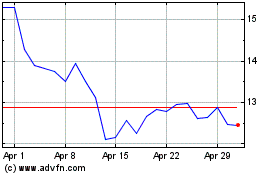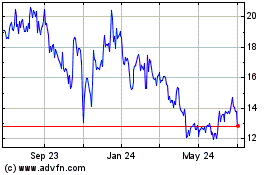How Two Compliance Officers Tackled Risks Arising From the Coronavirus Pandemic
October 08 2020 - 9:20PM
Dow Jones News
By Mengqi Sun and Jack Hagel
To tackle health-care needs during the coronavirus pandemic,
companies have had to strike a balance between haste and prudence
-- an act that often requires the attention of compliance teams
grappling with amplified risks and fewer resources.
"There's a volume and a speed at which we've needed to respond
to ensure that we [are] meeting the same standards and the same
requirements that we would always, understanding the risk profile
probably changes somewhat, knowing that you're addressing a global
health crisis," Ashley Watson, Johnson & Johnson's chief
compliance officer, said Thursday at the WSJ Risk & Compliance
Forum.
The New Brunswick, N.J., health-products company has been
working with governments and other companies to try to find
solutions to address the pandemic, such as developing a Covid-19
vaccine.
The effort has required the company to take on new suppliers and
partners quickly while still conducting the necessary due diligence
to ensure that they meet the company's compliance expectations.
"Just your ability to connect with them is tougher in a virtual
environment," Ms. Watson said.
More than half of the compliance professionals that responded to
a recent Wall Street Journal survey said they experienced increases
in new third-party risks as a result of Covid-19. Many of the
respondents also said their relationships with third-parties have
become harder during the pandemic.
Companies outside the health-care sector have had the added
burden of learning the expectations of new regulators and hastily
vetting unfamiliar suppliers to make pandemic-related products
outside their typical processes.
VF Corp., the Denver-based maker of Dickies work clothes and
Vans sneakers, shifted production to make millions of medical gowns
and hundreds of thousands of face masks. The effort required a new
grasp of rules governing the manufacturing of protective equipment,
understanding of how those rules change by jurisdiction, and
investigating whether potential new suppliers will follow them,
according to Kellye Gordon, the company's vice president of ethics
and compliance and legal operations.
Potential suppliers, perhaps out of a need to win a lucrative
contract or maybe even survive, might be willing to skimp on
compliance, increasing third-party risks, she said. "And so in
terms of our ability to vet those suppliers, that actually became
even more important with regards to quality assurance," Ms. Gordon
said during a Forum panel.
There are also supply chain, export and even antitrust
considerations Ms. Gordon's team has had to manage when
collaborating with certain partners on new production lines.
"You've got to think about sharing competitive information and
making sure that you are removing all the risks related to pricing
and confidentiality," she said. The company has sought to mitigate
those risks through additional training.
Companies have also had to manage risks not just with selling
pandemic-focused products, but with simply giving them away.
Donations and charitable giving, if done improperly, can be viewed
as a bribe. That is tricky when government agencies or
government-affiliated health-care facilities are in need of
products a company might have.
"It's definitely a risk that everyone needs to pay attention
to," said Ms. Watson, whose company has donated masks and other
medical supplies and equipment to organizations around the
world.
"You're in this time, where it's like, 'Of course, we can give
it away because we're in this global pandemic,' " she said. But
companies need to be mindful of how charity could run afoul of the
law and they need to monitor donation amounts and reasoning to
avoid improperly influencing.
"We had to shift resources to really think about what's the
right standard in this environment to make sure that we are, in
fact, giving donations in an appropriate way," Ms. Watson said.
Additional compliance risks come as companies are also having to
cut back or delay spending due to the economic fallout arising from
the pandemic. About 21% of compliance professionals expect a
reduction in resources next year, according to the Journal's
compliance survey, results of which were released as part of the
Forum. About half of respondents expect no change.
VF temporarily closed stores across North America at the
beginning of the pandemic, and the company's revenue fell by almost
half in its first quarter, which ended in June, compared with a
year earlier.
Facing budgetary constraints, the company's compliance team has
reprioritized its risks, focusing on the most pressing issues. The
company has repurposed compliance employees to take on work that
might otherwise have been outsourced to avoid job cuts, according
to Ms. Gordon. A compliance employee with a legal background, for
instance, took on a lease project that might have otherwise been
done by an external service provider.
"It's things and fundamentals that we as a compliance team have
to go back to: prioritizing the work," she said.
Write to Mengqi Sun at mengqi.sun@wsj.com and Jack Hagel at
jack.hagel@wsj.com
(END) Dow Jones Newswires
October 08, 2020 21:05 ET (01:05 GMT)
Copyright (c) 2020 Dow Jones & Company, Inc.
VF (NYSE:VFC)
Historical Stock Chart
From Mar 2024 to Apr 2024

VF (NYSE:VFC)
Historical Stock Chart
From Apr 2023 to Apr 2024
